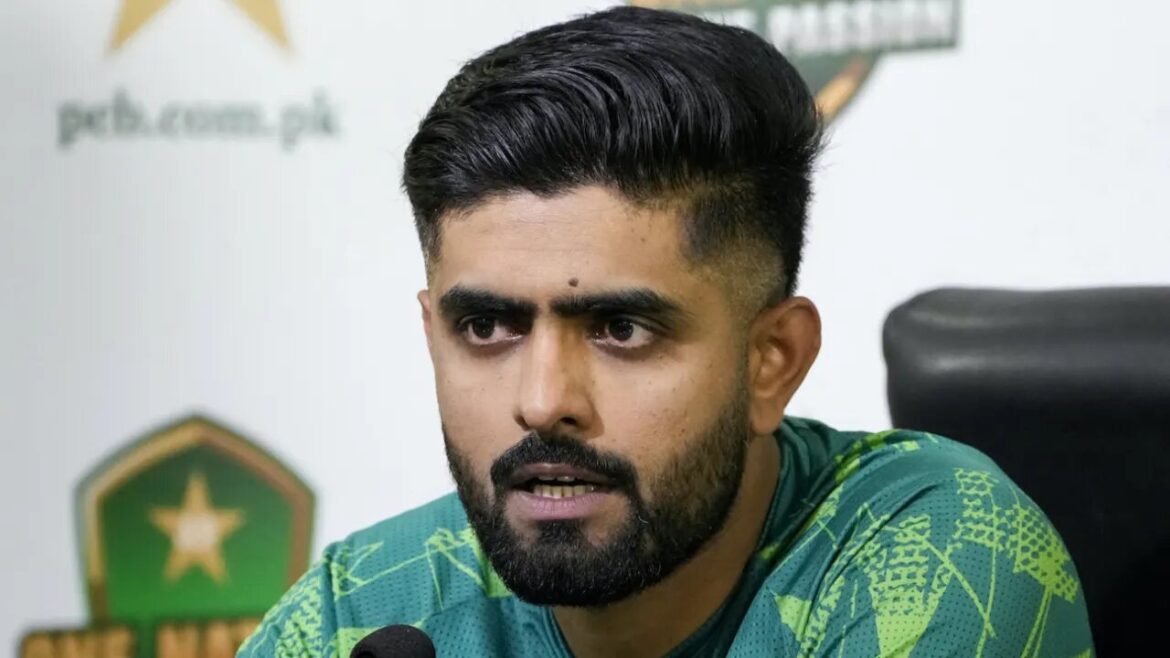It can feel like Pakistan captain Babar Azam always says the same things, but perhaps he always gets asked the same questions, too. Ahead of Pakistan’s departure for Ireland and the UK, Pakistan’s last preparatory pit stop before the T20 World Cup in the US and the Caribbean, Babar sat down for a press conference, and was fielded familiar questions on Pakistan’s chances, their squad selection, and of course, Pakistan’s top order.
“What happened in the past is in the past,” Babar began, before recognising the question about his team’s trophy chances has been asked multiple times before, and returned to tread familiar ground. “Our aim was always to bring the trophy home, and we’re doubly confident and believe we can bring the trophy home. I’ll always believe in my players as captain, and we’ll give our best at the World Cup.”
One of the prominent themes around the conference regarded two players named Haris at the top and tail of a Pakistan line-up: more specifically, the inclusion of one and the absence of the other. Haris Rauf has, in the last six months, been openly criticised by then-chief selector Wahab Riaz as “hurting Pakistan cricket” when he pulled out of Pakistan’s Australia tour, going on to have his central contract ripped up, before being injured during the PSL and having his central contract reinstated once more. Having nursed his way to fitness, he is back in the Pakistan side.
“Haris Rauf’s fitness is much improved; I wasn’t expecting him to recover so fast,” Babar said. “He’s positive about his involvement in the tournament and very driven to succeed. There’s pressure on him because there’s been a lot of talk about him, but I think he’ll come back strong. When you come back from a rest, mentally, physically, you can create quite an impact.”
Mohammad Haris, meanwhile, continues to be frozen out. His most famous achievements in an international shirt came at the last T20 World Cup, when he invigorated a sagging Pakistan World Cup campaign, and was one of the key architects of Pakistan’s unexpected surge to the final. He has had a more difficult time since, dropped inexplicably for Pakistan’s tour of New Zealand at the start of this year. An indifferent PSL didn’t help, and as things stand, he isn’t in Pakistan’s plans.
Babar, who plays alongside Haris for Peshawar Zalmi, acknowledged that Haris may not have got the opportunities following that World Cup he might have expected.
“He didn’t get a full opportunity after that World Cup but he belongs in the top order. In the top order, we already have [Mohammad] Rizwan, Fakhar [Zaman], Saim [Ayub] and myself. He got an opportunity in the PSL, but the way he wanted to execute, he couldn’t. That doesn’t make him a bad player because it happens to every player at some point. We then discussed where we would play him. If we’d kept him in the side he’d have been forced to play in the lower-middle order. And then we went with the best possible collective combination.”
Perhaps the most contentious pick of Pakistan’s squad was the recall of Hasan Ali, who last played a T20I in 2022, to the T20I side for Pakistan’s games in Ireland and England. That Pakistan dropped Zaman Khan from that 18-member squad equally raised eyebrows, even if Zaman hasn’t necessarily hit his best form over the last few months.
Babar implied it was possible – likely, even – that Hasan wouldn’t make the World Cup squad, as things stood, attributing his return to experience.
“With Hasan, the selectors have also clarified that he’s there as backup. He’s not guaranteed to be in the 15. He’s here because he has T20 experience and experience in general. Zaman Khan is among the best bowlers but he’s a new-ball bowler. We already have 3-4 bowlers with the new ball. No one’s here on one person’s recommendation; there are seven selectors and everyone gave their opinion before a decision was made.”


